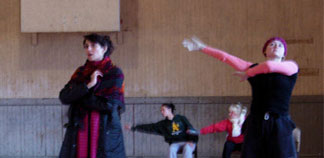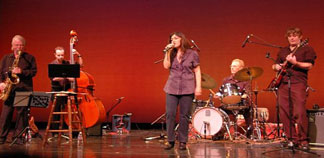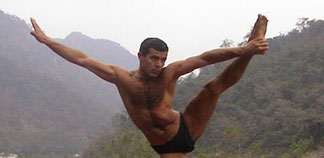به زبان فارسی
PICTORY
LATEST MUSIC
SEARCH
VOICES
17-Nov-2007 (24 comments)
We live in a world which still suffers seriously from an “us” versus “them” malady. Even in the absence of such bifocality, representing another culture is a hard thing to do. Now, add the fact that Iran and the U.S. have been embroiled in almost three decades of political conflict. In other words, no one will have a perfect solution. So far the villain versus the victim model has been the one applied most often. It provides something of an immediate relief for the burning questions we have “Why revolution?”, “How to make sense of some trends in present day Iran that seem backward looking?”>>>
DIALOGUE
15-Nov-2007 (4 comments)
Marjan Safinia and Joseph Boyle's "Seeds" documents one season at a special summer camp, "Seeds of Peace" in Maine, dedicated to helping plant the seeds of peace in young people from war torn or conflict regions in the world, who are lucky enough to be selected to attend. During their stay, along with the usual camp fun stuff, they are involved in various conflict management techniques to help deal with and open up the issues they are affected by in their every day life. Youth from Israel, Palestine, Egypt, India, Pakestan, and Afghanestan share what it is like to be a young person in these countries>>>
MOFID
12-Nov-2007 (10 comments)
سلام بیژن خان خوب، امروز سالگرد پریدن تو به سوی ماه کامل است. آمدهام بر فراز صدایت خم شوم و چند شاخه رؤیای خسته و مجروح، روی ترمهی دلتنگیات بگذارم، - بنفش، به رنگ خودت، رنگ نیلوفر خوابهای بودا-. راستی تو آن روزها که امید، هنوز امید بود، چه رنگی بودی؟... حتماً آن بالا، کنار دریای سیاه چشمهای گیس گلابتون، آنقدر بر سرنوشتات چیره شدهای که دیگر به روزهای تیره فکر نمیکنی.>>>
RAVANIPOUR
11-Nov-2007
زمان نشان داده است که نظام سیاسی کشور ما
فقط می تواند چهارشنبه سوری راکه نشانه صلح و دوستی بود به چهارشنبه سوزی
تبدیل کند دندان طمع از سیستمی که تمام این سالها خودی و غیر خودی کرده را
باید بکشیم برای زبان مادریمان کاری کنیم این عمارتی است که از سالیان سال
پیش به ما رسیده حداقل به اندازه گذشتگانمان تلاش کنیم و این زبان را به
ایندگان بسپاریم امید بسازیم در مقابل این همه ناامیدی که دامن مردم
کشورمان راگرفته
>>>
INTERVIEW
11-Nov-2007 (10 comments)
Time has shown that the political system in our country can only change our holiday “Chehar-shanbeh Soori” (literally means ‘Wednesday celebration’) which is a sign of friendship and peace into “chehar-shanbeh Sooozi” (which translates to Wednesday inferno). The system that has created the conniving mentality of pitting “us” against “them” and it has to be removed by the root, before we can do something for our own language. This language is a gift that has been handed down to us and the least we can do, is as much as forefathers did, which is pass it down to the next generation. We need to build hope against all this hopelessness that’s so rampant in our country.>>>
PROFILE
08-Nov-2007 (3 comments)
It is unusual for the French press to agree on anything, divided across the political divide as they are. But when it comes to hailing Marjane Satrapi’s new animated movie, ‘Persepolis’, they speak as one. From the right wing newspaper ‘Le Figaro’, to left wingers ‘Humanité’ and ‘Libération’ and centrist ‘Le Monde’, all have hailed Satrapi’s movie as a work of pure excellence and highly successful in breaking down stereotypes on Iranians and Iran. Gloria Steinem has even gone so far as to proclaim that with this film, Marjane Satrapi “may have given us a new genre” while ‘USA Today’ called it “a mighty achievement”>>>
AUTHOR
07-Nov-2007
در مثلث نویسنده، متن و خواننده، خواننده نیرویی خدایی دارد، زیرا اگر او متن را نخواند، هیچ چیز به وجود نخواهد آمد و نویسنده درون حروف بی جان متن خود گرفتار می ماند. به علاوه آغاز کار خواننده به پایان نگارش متن موکول نمی شود، بلکه نویسنده به محض اینکه قلم بر می گیرد خواننده ی خود را در ذهن دارد و تصویر خواننده هرگز در جریان کار نگارش ناپدید نمی شود. به عبارت دیگر، هر نویسنده، درون خود خواننده ای دارد که نه تنها به او گوش می دهد، بلکه هم چنین با او سخن می گوید، و حتی گاهی چون همبازی خیالی کودکان، دارای نام است.>>>
ROCK
06-Nov-2007 (94 comments)
I met Kiosk's Arash Sobhani for the first time at Yoshi's (a famous jazz club here in San Francisco) through a mutual friend, Afshean. This is 5-6 months after I moved to San Francisco. Arash had moved to San Jose just a few weeks before, and was looking for a place here. I recalled I didn't know many people when I moved here, and out of empathy, gave him my number and told him he can call if he needs help to move his stuff. I was fool enough not to remember that he's a rock star, that he knows half of the Bay Area, and the other half he doesn't know, know him!>>>
REFLECTION
06-Nov-2007 (2 comments)
Nothing is as it seems, as they say. Plot twists reveal surprising hidden motivations, and in the tradition of sophisticated drama, each character sees the others more clearly than he sees himself. For example Kermani’s plea to save Iranians who would die in the impending war are countered by Muthada’s reminder that Kermani isn’t as concerned with life when it comes to the Islamic regime’s support of terrorism, and the brutal suppression of internal dissent. Sadly, Kermani does not put up a worthy defense. This is partly because the Islamic regime’s position is difficult to uphold in the first place>>>
RECENT COMMENTS
IRANIANS OF THE DAY
| Person | About | Day |
|---|---|---|
| نسرین ستوده: زندانی روز | Dec 04 | |
| Saeed Malekpour: Prisoner of the day | Lawyer says death sentence suspended | Dec 03 |
| Majid Tavakoli: Prisoner of the day | Iterview with mother | Dec 02 |
| احسان نراقی: جامعه شناس و نویسنده ۱۳۰۵-۱۳۹۱ | Dec 02 | |
| Nasrin Sotoudeh: Prisoner of the day | 46 days on hunger strike | Dec 01 |
| Nasrin Sotoudeh: Graffiti | In Barcelona | Nov 30 |
| گوهر عشقی: مادر ستار بهشتی | Nov 30 | |
| Abdollah Momeni: Prisoner of the day | Activist denied leave and family visits for 1.5 years | Nov 30 |
| محمد کلالی: یکی از حمله کنندگان به سفارت ایران در برلین | Nov 29 | |
| Habibollah Golparipour: Prisoner of the day | Kurdish Activist on Death Row | Nov 28 |




![Seeds [of peace] Seeds [of peace]](../../files/storyimages/safis.jpg)











